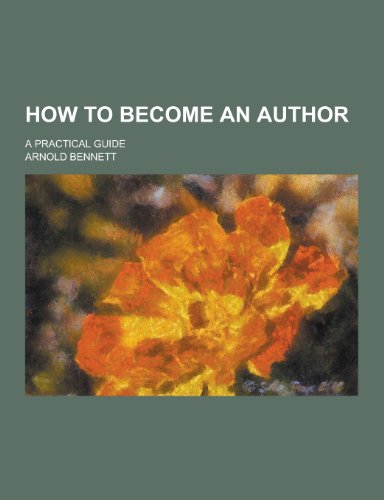How to Become an Author; A Practical Guide - Softcover

This historic book may have numerous typos and missing text. Purchasers can usually download a free scanned copy of the original book (without typos) from the publisher. Not indexed. Not illustrated. 1903 edition. Excerpt: ...broadly. Make the heroines beautiful, the heroes brave, the villains villainous, and the conversations terse and theatrical. (5) Incident must be evenly and generously distributed. (6) Avoid long paragraphs. (7) Avoid scenes of squalor or poverty, except as an occasional foil to the atmosphere of wealth and splendour which should for the most part prevail. (8) Rouse the reader's curiosity and leave it unsatisfied at the end of every instalment, except, of course, the last. There is plenty of scope, even within these prescribed conditions, for the exercise of the inventive and constructive faculties, and of the imagination. I can find no reason why the sensational serial should not be deemed a legitimate form of literary art, and I would advise the cultured aspirant not to pour out his scorn upon it. As a training in plot construction and in narrative, the composition of sensational serials is decidedly valuable.1 Sensational serials sell at moderate prices. The syndicates will rise to thirty shillings per thousand when they are "well suited"; but a more ordinary rate of pay is a pound per thousand, and this, having regard to the fact that sensational stuff, after it is planned out, can be written very quickly, is not an inadequate return to an unknown author. It is quite possible for a sixtythousand-word serial to be written in a month, and I have heard several serialists boast that they compose on the average five or six thousand words a day. A serialist with a reputation will naturally command higher wages than a serialist without a re 1 The beginner should study the works of Dumas the elder and of Eugene Sue. Also More New Arabian Nights, by R. L. Stevenson; Armadale, by Wilkie Collins; Cold Steel, by Mr. M. P. Shiel;...
"synopsis" may belong to another edition of this title.
About the Author:
Enoch Arnold Bennett, the son of a solicitor, was born in Hanley, Staffordshire in 1867. He was educated locally and at London University, before working initially as a solicitor's clerk, but soon turned to writing popular serial fiction and editing a women's magazine. After the publication of his first novel, 'A Man from the North' in 1898 he became a professional writer and some of his best and most enduring and acclaimed work, including 'Anna of the Five Towns', 'The Old Wives' Tale', 'Clayhanger', 'The Card' and 'Hilda Lessways' followed over the next twelve years. Soon after the outbreak of the First World War, Bennett was invited to join the War Propaganda Bureau, concerned with finding ways of best promoting Britain's interests. He was in good company, as others who contributed to this effort included Conan Doyle, John Masefield, G. K. Chesterton, Sir Henry Newbolt, John Galsworthy, Thomas Hardy, Rudyard Kipling, Gilbert Parker, G. M. Trevelyan and H. G. Wells. Bernard Shaw knew nothing of the Bureau, but attacked what he believed to be jingoistic articles and poems being produced by British writers. Bennett was the one chosen to defend their actions. He served on a War Memorial Committee at the invitation of the then Minister of Information, Lord Beaverbrook, and was also appointed director of British propaganda in France. His spells in Paris added to his reputation as a man of cosmopolitan and discerning tastes. After the War he inevitably returned to writing novels and also became a director of the 'New Statesman'. Bennett's great reputation is built upon the success of his novels and short stories set in the Potteries, an area of north Staffordshire that he recreated as the 'Five Towns'. 'Anna of the Five Towns' and 'The Old Wives' Tale' show the influence of Flaubert, Maupassant and Balzac as Bennett describes provincial life in great detail. Arnold Bennett is an important link between the English novel and European realism. He wrote several plays and lighter works such as 'The Grand Babylon Hotel' and 'The Card'. Arnold Bennett died in 1931.
"About this title" may belong to another edition of this title.
- PublisherTheClassics.us
- Publication date2013
- ISBN 10 1230368884
- ISBN 13 9781230368887
- BindingPaperback
- Number of pages34
- Rating
(No Available Copies)
Search Books: Create a WantIf you know the book but cannot find it on AbeBooks, we can automatically search for it on your behalf as new inventory is added. If it is added to AbeBooks by one of our member booksellers, we will notify you!
Create a Want
